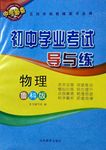题目内容
That light rail transit line(轻轨),started in July 2009 and _________in 2012, will be China’s longest light rail transmit line in history.
| A.completing | B.to be completed | C.completed | D.complete |
B
解析

练习册系列答案
 七星图书口算速算天天练系列答案
七星图书口算速算天天练系列答案 初中学业考试导与练系列答案
初中学业考试导与练系列答案
相关题目
 A. Concern, affection, expectation. B. Concern, hatred, expectation.
A. Concern, affection, expectation. B. Concern, hatred, expectation. ____ (传播 )much faster than sound.
____ (传播 )much faster than sound.